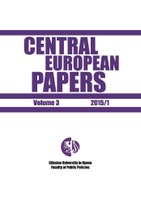The Nationalizing Processes in Slovakia 1969–1988.
The Nationalizing Processes in Slovakia 1969–1988.
The Case Study of Hungarian Minority
Author(s): Juraj MarušiakSubject(s): Inter-Ethnic Relations
Published by: Slezská univerzita v Opavě, Fakulta veřejných politik
Keywords: Slovakia; Hungarian minority in Slovakia; Committee for Protection Hungarian Minority Rights in Slovakia; dissent; Charter 77; Miklós Duray; nationalism
Summary/Abstract: The paper deals with the situation of Hungarian minority in Slovakia in the period of the regime of so called “Normalization” after the suppression of “Prague Spring” in 1970s and 1980s. The issue of minority policy of Czechoslovak / Slovak government is discussed as a specific aspect of the nationalizing policy. The paper is based on the archival research of the documents provided by Charter 77 and the Committee for Protection of the Hungarian minority rights in Czechoslovakia. The research question is, whether the Slovak Socialist Republic, established after the federalization of Czechoslovakia in 1968, was still a nationalizing state. Paper brings an analysis of the oscillation of the political initiatives within the Hungarian minority environment in Slovakia and the Slovak-Hungarian debate between the national and civic-democratic agenda. According to the conclusions, the Slovak Socialist Republic applied some nationalizing practices and policies, however due to the deformations of the Czechoslovak federation after 1969 it couldn’t become a uniquely nationalizing state. The debate on the minority rights and on the Slovak-Hungarian relations in the dissident environment and later, since 1988-1989 in the wider public space has a significant impact on the shaping of the political cleavages in Slovakia after the political changes in November 1989.
Journal: Central European Papers
- Issue Year: 3/2015
- Issue No: 1
- Page Range: 88-107
- Page Count: 20
- Language: English

